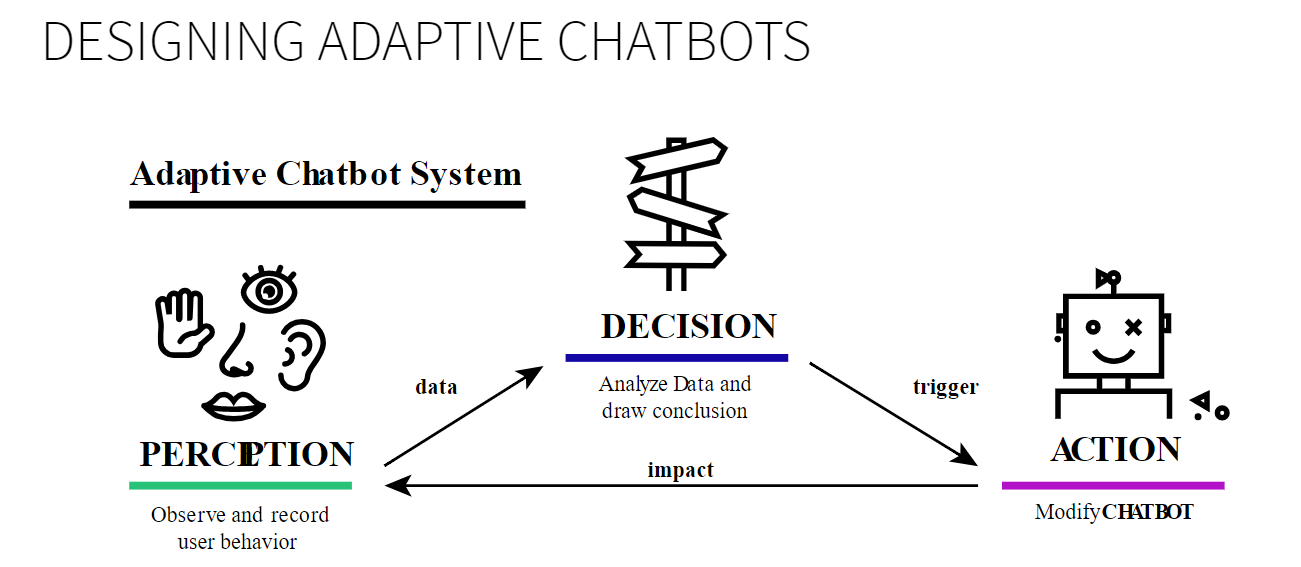Designing Socially-Adaptive Chatbots
- Type:Bachelor/Master Thesis
- Date:now
- Supervisor:
- Add on:
Status: Open
-

Introduction of Chatbots
Many service providers are currently dealing with the development of chatbots. Chatbots are software-based systems that communicate with the user over text- or speech-based natural language. They can be used to communicate with customers, provide information, or offer any other kind of digital service. Due to their big potential, chatbots are becoming increasingly popular and are currently seen as “one of the most hyped technologies” (Dale, 2016). A survey conducted by Oracle further revealed that 80% of all businesses want to use chatbots by 2020 (Oracle, 2016) and Gartner predicts that in the same year “the average person will have more conversations with bots than with their spouse” (Gartner, 2016). Consequently, chatbots are an interesting and popular technology which offers great research potential for different types of bachelor and master thesis.Problem Description
Bearing in mind the continuous rise of chatbots, it becomes increasingly important to incorporate existing design knowledge in the chatbot design in order to create a great user experience. This comprises both functional capabilities of a conversational agent’s dialog system as well as an agent’s specific design characteristics and features.
However, many service chatbots did not meet the customer expectations in the past and led to service failures. As a result, many service providers retired their chatbots, as unsatisfactory online service encounters have negative effects on word-of-moth, loyalty, and intention to repurchase a product. Thus, ignoring customer frustrations can strongly impede the performance of service encounters and carries the risks that service chatbots are perceived as cold, socially indebt, untrustworthy, and incompetent.Goal
To address this problem, a thesis project should investigate the adaptive design of chatbots that configure themselves to the user, task and context of an interaction. Adaptive systems are a promising approach as they have proved to enhance user satisfaction and performance in other contexts. Specifically, as humans constantly adapt themselves in intermediate communication (e.g., humans adapt their formality of speech according to the conversation partner), chatbot should also be adapted to different context, task, and user of a human-chatbot interaction. Thus, the goal of a thesis should be related to the design of adaptive chatbots in order to increase user satisfaction and reduce the risk of failures.Method
Each thesis is different and you can select from a wide range of methods (e.g., literature based approaches, quantitative approaches, programming and evaluation). For example, a project can focus on a chatbot artifact and can develop an innovative adaptive prototype. Also, you can derive design principles for an adaptive chatbot based on literature and/or evaluate design features in an experiment. Some initial ideas for a thesis are written below:- Review of real-world and online service recovery strategies and evaluation for a potential application in a service chatbot context
- Development of innovative adaptive chatbot using Microsoft’s Bot Framework
- Literature review about verbal and nonverbal chatbot adaptation and recovery strategies
- Experimental evaluation of chatbot design features (e.g., visual, verbal)
- Application of sentiment and emotion analysis to develop adaptive chatbots
Required Skills
- Interest in human-computer interaction, chatbots, and conversational agents
- High motivation to solve interesting real-world problems
- Good English skills as the thesis needs to be written in English
Contact
If you are interesting to write a Bachelor or Master thesis about adaptive chatbots, innovative chatbots, or social chatbots, please contact me directly via mail so we can discuss potential thesis topics. See you soon, Jasper.
jasper.feine@kit.edu
References- Dale, R. (2016). “The return of the chatbots” Natural Language Engineering 22 (5), 811–817.
- Oracle (2016). Can Virtual Experiences Replace Reality? The future role for humans in delivering customer experience. URL: https://go.oracle.com/LP=48982
- Gartner (2016). Top Strategic Predictions for 2017 and Beyond:. URL: http://www.gartner.com/binaries/content/assets/events/keywords/cio/ciode5/top_strategic_predictions_fo_315910.pdf


